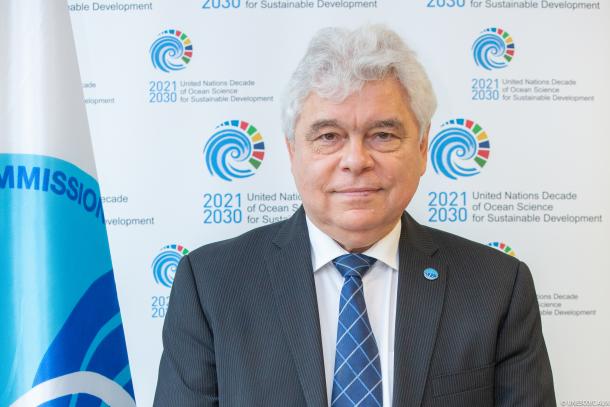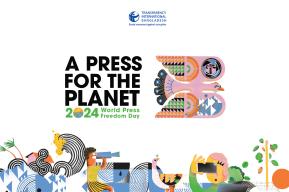News
Vladimir Ryabinin: the ocean is an amazing concentration of opportunities for very good actions

Tell us about yourself: why did you become interested in the ocean and how did you start working for the IOC?
VR: I was born in Kaliningrad, near Moscow. That's where the Mission Control Center is located, where the outstanding constructor Sergei Pavlovich Korolev worked. Due to the fact that this is a city of space engineers, as well as the famous Vympel team, from the very beginning I had quite a strong interest in two things: ball hockey, which flourished in this city, and the sciences. But the sciences won out over time.
The deciding factor in my life was one swim when I was diving near Feodosia and thought I had discovered a submerged underwater city. I swam to the surface, tried to orientate, where the place is, and forgot all (laughs). I started reading "In the World of Silence" by Jacques-Yves Cousteau and that's how around the age of 14 I fell in love with the ocean and decided to get involved with it.
At first I wanted to become an underwater archaeologist, but apparently my destiny was more "technical". I took up mathematics and physics. For a while, I was occupied with weather forecasts, various engineering projects in the Arctic. And since such a broad field of work obviously leads to an interest in activities related to climate change, it so happened that I was invited to work first as the director of the International Ocean Institute and later in the World Climate Research Program.
But my heart still belonged to the ocean, and in 2014 I was first elected, then appointed Executive Secretary of the Intergovernmental Oceanographic Commission of UNESCO. And I have been working on ocean science ever since.
What do you think are the major problems threatening the ocean?
VR: The ocean used to be considered limitless, but now our ability to pollute and disrupt the ocean is limitless. And as a result, there are many factors that are simply undermining the health of the ocean.
First and foremost is climate change, global warming. Now, for example, about 30 percent of the species in the ocean live in the coral reef area. And coral reefs, in turn, live at the upper limit of their thermal regime. That is, if we still raise the temperature, corals can no longer cope with it and die out - as a result, 30% of species are threatened with extinction.
Also serious problems are ocean acidification as a result of the carbon we emit into the atmosphere, as well as the decrease in oxygen production by the ocean. Many people know about plastic pollution in the ocean, but there are other types of pollution. For example, in coastal waters, seawater is essentially a mixture of solutions of various medical drugs, and other substances, of course.
Poaching is not to be overlooked either. Not the planned one, which would be done on such a scale and in such areas where ocean life would be preserved, but actual poaching.
The result is what we call "complex stressors" that affect the ocean. When you're attacked by one bully, you can fight back, but when you're attacked by four bullies from different directions, it's much harder to fight back. That's where the ocean comes in.
The ocean used to be considered limitless, but now our ability to pollute and disrupt the ocean is limitless.
And what actions can the average person take to solve these problems?
VR: I would say it this way: everyone should have a common understanding of what can and should be done for the ocean. Unfortunately, homo sapiens has become a land animal. And we don't know at all what is happening to the ocean.
It's important enough to understand that the ocean, for example, generates more than 50% of the oxygen in the earth's atmosphere. And that the ocean is the source of life preservation on the planet, because the heat capacity of water is about 1000 times greater than the heat capacity of atmospheric air. As a result, more than 90% of the energy we generate through excess carbon dioxide emissions is stored in the ocean. It is desirable to know and appreciate the environment that creates and preserves life on the planet as a whole.
And as for what everyone can do - in my opinion, you just need to be a normal person. Less littering, limit the use of disposable plastic products. Remember that fighting the climate is fighting for the health of the ocean. Fighting pollution is about supporting the ocean. Consume fish produced in sustainable fisheries without damaging marine ecosystems. We need to own this information and use it, it can be found on the IOC website.
The ocean generates more than 50% of the oxygen in the Earth's atmosphere. It is the source of life preservation on the planet, because more than 90% of the energy we generate through excess carbon dioxide emissions is stored in the ocean.
Which is the most memorable IOC project for you personally and why?
VR: You know this is always a very sensitive question. But I must say that I have a pretty clear answer in that respect.
When I came to work at the IOC in 2015, we undertook an assessment of what needed to be done in the ocean. And we realized that ocean science, which is very necessary for the survival of humanity and the health of the ocean, was just not sufficiently supported by nations. We don't have any international convention that says you have to make observations in the ocean, support research. It's all done on a voluntary basis. And as a result, we decided to change that, but without creating a convention. We have proposed the UN Decade of Ocean Science for Sustainable Development.
This is by far the largest project in the history of ocean science. And very importantly, it is not just research that focuses on the traditional scientific curiosity of scientists. This is research aimed at expanding ocean science; at making it more powerful and able to contribute to the UN's sustainable development goals.
So far we have been quite successful in this project. There's about $1 billion working for this program right now, and there are about 200 different projects and about 40 different programs. It's important to note that we're not just measuring the ocean, modeling it, but changing the ethics of how we treat the ocean. We have a program on women's leadership in ocean science; young scientists; on developing empathy for the ocean. So it's not just a technical framework, but it's a very culturally and ethically oriented activity that changes the way we think about the ocean.
Can you describe what you would like the ocean to be like by 2030?
VR: I have a very clear vision of that. And that vision is reflected in the implementation plan for the Decade. We've identified seven features of the ocean. It is an ocean that is clean, that is healthy, that is productive, that is accessible to human activities. It is also an ocean that is delightful and inspiring. I wish that people would be inspired by these ideas and that these ideas would take them over. And then we would change not only the ocean, but also the people, which is very important.
And I have to say that in addition to these sentiment-oriented adjectives, there's a pretty clear idea of what we need to do in the ocean. As the Decade passes, we want to create an ocean management system around the world that is based on science, which in its turn will generate for people the benefits necessary for human survival, prosperity, and normal life. And at the same time keep the ocean healthy. Creating such a system of ocean governance is my dream by 2030.
What would you say to people who care about the ocean and would like to do their part to protect it?
VR: I would have to say that the ocean is an amazing concentration of opportunities to do very good things. Because of the fact that the ocean is not owned by countries, it is a platform for interaction that is much less controversial than, say, relations between countries on land. And so ocean activities have this amazing tendency: it's interesting, it attracts a lot of exceptionally decent people, and it's also scientifically quite deep and interesting. It's an absolutely incredible ecosystem in which people flourish and live in a harmonious environment. So welcome to the ocean!





